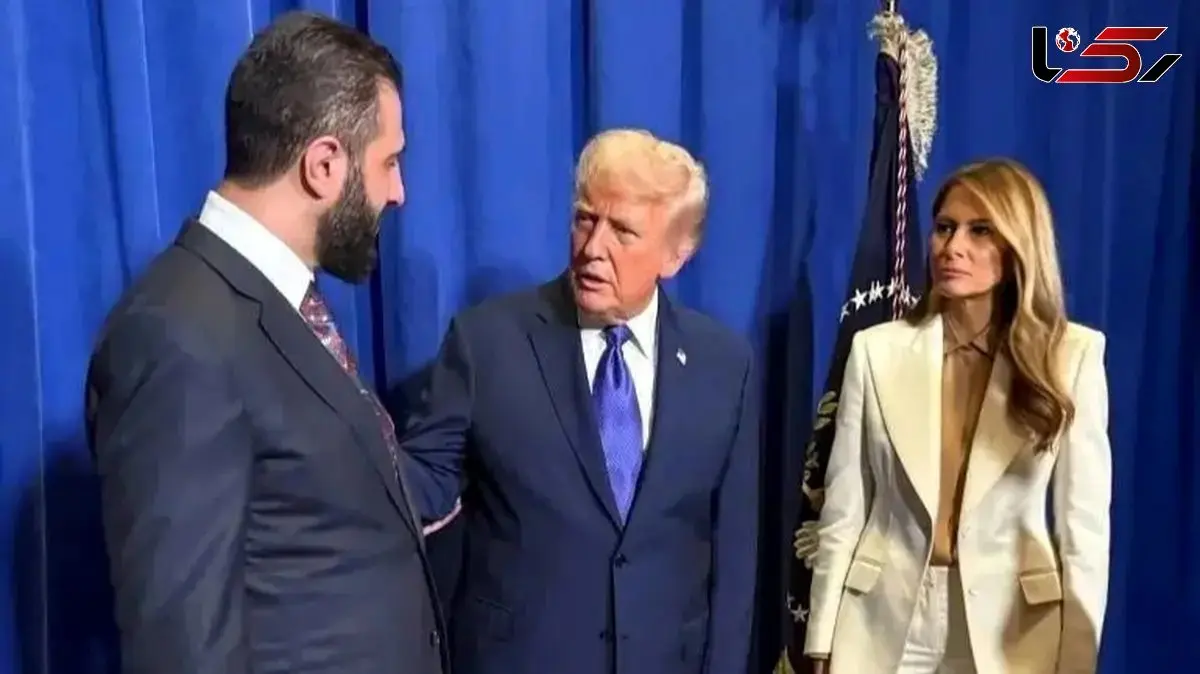The highest-ranking Syrian official visits Washington after 80 years
The White House hosts al-Sharaa: A new chapter in U.S.–Syria relations
Rokna Political Desk: Ahmad al-Sharaa, the interim president of Syria, in an unprecedented meeting with Donald Trump at the White House, entered through the back door of the building—contrary to customary protocol—marking the beginning of a new chapter in U.S.–Syria relations.

On Monday local time, U.S. President Donald Trump met with Ahmad al-Sharaa, the interim leader of Syria, at the White House. The visit is historically significant, as the former rebel has become the first Syrian head of state to visit Washington officially since the country gained independence in 1946.
According to a released video, al-Sharaa entered the president’s office through the rear entrance of the White House, in contrast to the traditional protocol of receiving foreign leaders.
A White House official confirmed in remarks to Reuters that the meeting between Trump and al-Sharaa had begun.
Another White House official told the Associated Press that the meeting would be private, without media coverage or the presence of reporters.
This marks the first official visit of a Syrian head of state to the White House since Syria’s independence from France in 1946, symbolizing a major shift in bilateral relations after decades of severed ties and heavy sanctions.
The United States had previously lifted sanctions against Syria following the collapse of Bashar al-Assad’s government in December 2024 and the formation of the interim government led by Ahmad al-Sharaa, also known as Muhammad al-Jolani. The U.S. also removed his name and that of Syrian Interior Minister Anas Khattab from the al-Qaeda and ISIS sanctions lists. Al-Sharaa, who led opposition forces during the overthrow of Assad’s regime, was appointed interim president of Syria in January 2025.
Two decades ago, when al-Sharaa was fighting against U.S. forces as a member of al-Qaeda-linked militias, he was imprisoned in an American-run detention facility in Iraq. Few could have imagined that he would one day become the first Syrian head of state to make an official visit to Washington in eighty years.
Trump and al-Sharaa first met in May in Saudi Arabia, where Trump described him as “a young, charismatic, and hardworking man with a turbulent past.” That meeting was the first high-level contact between the two nations since the year 2000, when then-President Bill Clinton met with Hafez al-Assad, Bashar al-Assad’s father.
White House spokesperson Karoline Leavitt described this meeting as part of the president’s diplomatic initiative “to engage with all world leaders in pursuit of peace.”
According to informed sources in the Trump administration, Syria is expected to join the U.S.-led Global Coalition to Defeat ISIS, even though the newly formed Syrian army and the Kurdish-led Syrian Democratic Forces have already been fighting ISIS in the country’s northeast.
Prior to al-Sharaa’s arrival in Washington, the United Nations Security Council agreed to lift sanctions on him and other officials of the new Syrian government. U.S. Ambassador to the United Nations Mike Waltz described the move as “the beginning of a new era in Syria after Assad’s downfall.”
Al-Sharaa arrived in Washington with a clear agenda: to secure the complete and permanent removal of sanctions imposed on Damascus during Assad’s rule for widespread human rights violations. Although Trump has already suspended the Caesar Act sanctions, a permanent repeal requires congressional approval.
Two competing bills are currently under discussion in Congress. One, proposed by Senator Jeanne Shaheen, the Democratic chair of the Senate Foreign Relations Committee, calls for the unconditional repeal of sanctions. The other, sponsored by Republican Senator Lindsey Graham, proposes a conditional repeal with semi-annual reviews.
Civil organizations have warned that conditional repeal would deter foreign investment in Syria, as companies would fear the potential reinstatement of sanctions. Mouaz Mustafa, executive director of the Syrian Emergency Task Force, told the Associated Press that “such conditions hang like a shadow that could paralyze any economic initiative to rebuild the country.”
This meeting comes as the United States has recently lifted sanctions imposed on Syria during the Assad family’s rule—an action viewed by analysts as a major step toward Syria’s reintegration into the international community.
According to sources close to the White House, discussions between the two sides will focus on security cooperation, Syria’s post-war reconstruction, and efforts to establish stability in the Middle East. This marks the first time a Syrian president has been formally invited to the White House, and observers describe the meeting as historic and unprecedented—signaling the beginning of a new phase in bilateral relations.
One day before his official meeting with the U.S. president, al-Sharaa met on Sunday with members of the Syrian diaspora community in Washington.
According to Rokna, citing Syria’s state news agency, SANA, the meeting was attended by Syrian Foreign Minister Asaad Hassan al-Shaybani and U.S. Special Envoy for Syria Tom Barrack. Al-Sharaa spoke about the domestic and international achievements of the new government, calling them signs of “a new era of stability and reconstruction” in Syria.
He emphasized the role of Syrians abroad in maintaining ties with their homeland and presenting Syria’s true image to the world, saying, “The Syrian expatriate community serves as a bridge between the people and the government and can amplify the voice of the Syrian nation across the globe.”
U.S. envoy Tom Barrack reaffirmed Washington’s commitment to helping Syria return fully to the regional and international stage, saying the United States supports the process of reintegrating Damascus into the global system.
Send Comments